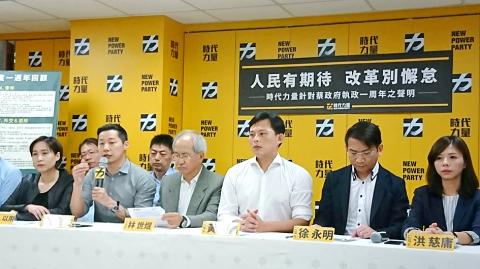The New Power Party (NPP) criticized slow government progress on key reforms yesterday, just ahead of the anniversary of President Tsai Ing-wen’s (蔡英文) inauguration.
“We’re worried that many reforms will only be half done,” NPP caucus whip Hsu Yung-ming (徐永明) said, citing slow progress on articles for furthering transitional justice, along with an amendment to the Referendum Act (公民投票法).
He added that while cross-strait relations are an important domestic consideration, they should not serve as an excuse to drag out political “normalization,” such as removing the last vestiges of the provincial government.

Photo: Yang Chun-hui, Taipei Times
“When we proposed an agenda for constitutional reform last year, the ruling party said it would set its own pace and schedule for pushing reform, but the Democratic Progressive Party [DPP] is about to enter its second year in power. Constitutional reform is not something that can be achieved in one big leap — if we still cannot see a schedule, I have trouble imagining how any constitutional reforms can be accomplished by the end of the DPP’s term,” NPP Legislator Freddy Lim (林昶佐) said.
Constitutional amendments are necessary to fundamentally address issues such as lowering the voting age and clarifying the nation’s relationship with Aborigines, he said.
NPP Legislator Hung Tzu-yung (洪慈庸) criticized the slow progress in realizing housing policy goals, as well as the failure to ameliorate the long working hours and low wages faced by the nation’s young people.
“Currently, the issue of providing public childcare is still just empty talk,” Hung said.
NPP Legislator Kawlo Iyun Pacidal, an Amis, criticized the passage of a bill aimed at reviving Aboriginal languages for failing to specify the sources of funding.
Michael Lin (林世煜), president of the NPP’s think tank, criticized the DPP for treating voters as “teammates” before the election and “pig-heads” afterward.
Citing the Forward-looking Infrastructure Development Program bill passing a review by the legislature’s Economics Committee, he said the DPP had become more arrogant, willing to discuss its policies prior to elections, but “treating people as its enemies” afterward.

US climber Alex Honnold is to attempt to scale Taipei 101 without a rope and harness in a live Netflix special on Jan. 24, the streaming platform announced on Wednesday. Accounting for the time difference, the two-hour broadcast of Honnold’s climb, called Skyscraper Live, is to air on Jan. 23 in the US, Netflix said in a statement. Honnold, 40, was the first person ever to free solo climb the 900m El Capitan rock formation in Yosemite National Park — a feat that was recorded and later made into the 2018 documentary film Free Solo. Netflix previewed Skyscraper Live in October, after videos

NUMBERS IMBALANCE: More than 4 million Taiwanese have visited China this year, while only about half a million Chinese have visited here Beijing has yet to respond to Taiwan’s requests for negotiation over matters related to the recovery of cross-strait tourism, the Tourism Administration said yesterday. Taiwan’s tourism authority issued the statement after Chinese-language daily the China Times reported yesterday that the government’s policy of banning group tours to China does not stop Taiwanese from visiting the country. As of October, more than 4.2 million had traveled to China this year, exceeding last year. Beijing estimated the number of Taiwanese tourists in China could reach 4.5 million this year. By contrast, only 500,000 Chinese tourists are expected in Taiwan, the report said. The report

Temperatures are forecast to drop steadily as a continental cold air mass moves across Taiwan, with some areas also likely to see heavy rainfall, the Central Weather Administration (CWA) said. From today through early tomorrow, a cold air mass would keep temperatures low across central and northern Taiwan, and the eastern half of Taiwan proper, with isolated brief showers forecast along Keelung’s north coast, Taipei and New Taipei City’s mountainous areas and eastern Taiwan, it said. Lows of 11°C to 15°C are forecast in central and northern Taiwan, Yilan County, and the outlying Kinmen and Lienchiang (Matsu) counties, and 14°C to 17°C

STEERING FAILURE: The first boat of its class is experiencing teething issues as it readies for acceptance by the navy, according to a recent story about rudder failure The Hai Kun (海鯤), the nation’s first locally built submarine, allegedly suffered a total failure of stern hydraulic systems during the second round of sea acceptance trials on June 26, and sailors were forced to manually operate the X-rudder to turn the submarine and return to port, news Web site Mirror Daily reported yesterday. The report said that tugboats following the Hai Kun assisted the submarine in avoiding collisions with other ships due to the X-rudder malfunctioning. At the time of the report, the submarine had completed its trials and was scheduled to begin diving and surfacing tests in shallow areas. The X-rudder,